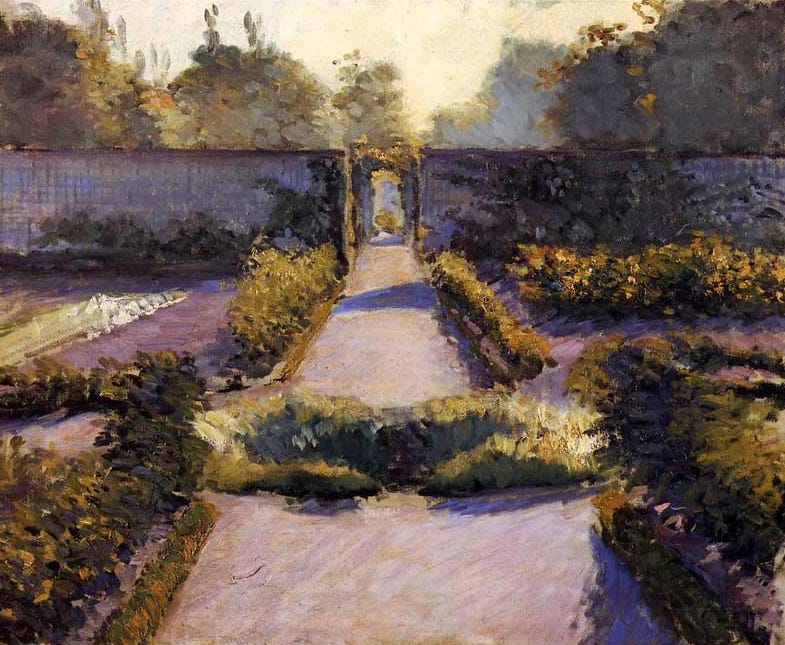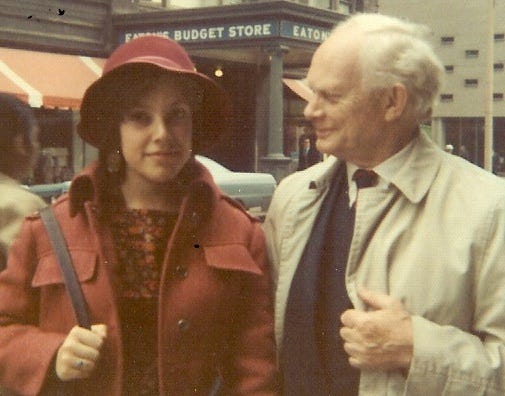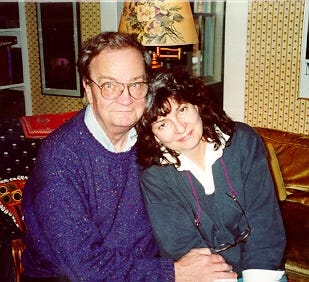Things We Say with Flowers
On a big birthday, truth dawns: One of us will die before the other. Please, let it be me.
“I like to treat myself,” said the shopper behind me at the checkout as she placed a single item on the belt—a six-dollar spray of red roses, more baby’s breath than blossom. She looked to be pushing 80, a hollow-cheeked pensioner on a budget. “My husband used to buy me flowers, but then he got sick. He died two months ago.”
She was talking to no one in particular, but I was the one who looked up from a tub of Greek yogurt, a box of raspberries, that sugar-free cereal my husband likes (you pay a premium for sugar-free), a bunch of mint for Campari Milano cocktails, and a pound of sweet butter. How can two oldsters go through so much butter? The woman was opening her wallet, counting change. “Enjoy your flowers,” I said.
I took her for one of those lonely people who shop for the conversation. As I tossed the last item into my cart, she trilled, “I love flowers. I live alone, and when I have flowers in the house, I feel like having people over.”
I tried to picture her next dinner. A poached egg on toast? A bowl of Cheerios? If you’re having people over, you buy more than a bunch of roses a day or two past their prime.
“Why don’t I order flowers?” asked my husband. He was thinking of my birthday, also our anniversary. Fifty-four years. He had booked dinner out with a flight of wines.
“Someone’s already sending flowers.” Their florist, in a posh neighborhood, had called to alert me. Who it was, I had no idea.
Paul knows I meet quite a few men, all down on their luck and keen to flirt with any woman who walks a sprightly dog. Casey likes to have his butt scratched, I tell them, to which one fellow responded, “Me too, but it’s been a good while.” If he ever bought anyone flowers, it must have been carnations for a prom date.
I’ve never been one for secret admirers, but someone was thinking sweet thoughts of me. Thank you, dear Someone.
We had no flowers for the ragtag party that followed our wedding at city hall the day I turned 21. If not for the sandwiches my mother slapped together, our guests would have gone hungry. My mother had warned that I’d regret this marriage. My father, who left his first wife early on, took a more philosophical view: “Everyone is entitled to one mistake.” Another year would pass before Joni Mitchell, on Blue, poked fun at any couple whose bed city hall had blessed. But our friends all agreed that marriage wasn’t cool. If we had to do it, they’d come to raise a glass or half a dozen.
Back then I thought my husband should love everything about me. What kept him hanging around if he couldn’t or wouldn’t accept my surliness morning after morning, my disdain for the sight of his jeans on the living room floor? I finally get it: He loves the real and ragged me with no illusions. Our marriage is older than some of my friends, yet Paul remains my fundamental friend. We’ve seen each other through the births of grandkids and the deaths of parents, homes furnished and stripped for the moving truck, two careers built over decades and gone in a day. During lockdown, we ordered steak and donned party wear to toast our first 50 years. Casey, our only witness, waited at our feet for scraps.
So far, we’ve both escaped any medical condition more dire than arthritis (mine) or diabetes and hypertension (his). Yet we have reached the age when, as Paul likes to remind me, “We’re one doctor’s visit away from the news that changes everything.” Two months ago I took Casey to the vet for what looked like the usual old-dog stuff and turned out to be inoperable cancer. He was spending this weekend of weekends at the Doggie Farm—to humans a boarding facility, to dogs the font of all pleasure—for one last romp and roll and splash.
The morning before my birthday, Paul shook me awake at 5:30 and said, “Feel my pulse.” My gruff bedside manner turns to bewilderment when I’m the one in bed, pulled from the cocoon of sleep. Looking for his pulse, which had apparently gone haywire, was like sifting the kitchen garbage for the cap to the extra-virgin olive oil.
We live a five-minute Uber ride from emerg, where in the past I’ve been known to spend many hours before being sent on my way in a state of light-hearted chagrin. A 75-year-old with an irregular heartbeat will not get the worry-wart treatment. He will be hustled into the inner sanctum to lie on a hospital bed while hooked up to monitors and questioned by a procession of people who have all the cool efficiency of characters on Grey’s Anatomy without the improbable beauty.
My husband’s eyes, a startling shade of blue, were the only flash of color in the little beige box where he lay, a gowned and diminished version of himself. Sorry, no water allowed until the doctor saw him. When that might be, who could say? A hospital whirs and chugs according to a rhythm of its own. We agreed that our own breakfast table was as good a place as any for me to wait for news. Besides, Paul might start missing the essentials of life. I may be hopeless at finding his pulse, but you should see me chase down his headphones and charger.
Paul and I have a running joke about the things I’ll never do again if he dies before me. Watch Netflix (those confounding remotes). Uncork a bottle of bubbly. Go anywhere that’s not on the Toronto subway line. And then there are the lids I struggle to unscrew (mustard, salsa, don’t get me started). It’s as if, by laughing at imagined widowhood, I can preserve the Us we have fashioned from a loggerheaded You and Me. When we were young and full of ourselves, I could have killed my husband for defending capital punishment. Couldn’t he understand that if someone murdered me, I wouldn’t want that person executed? Said Paul, with maddening aplomb, “So what? You wouldn’t be here.”
Soon enough, one of us will be here without the other. I hope it’s not me. I don’t want to be left on shore while the boat that carries half of Us becomes a bath toy and then a dot and eventually nothing at all.
Jane Kenyon, a poet I treasure, was married 23 years to fellow poet Donald Hall, her former teacher and mentor, 19 years her senior. When they took their vows, neither doubted that Kenyon would be widowed young. Hall’s bout with an aggressive cancer underscored both the power and the fragility of their bond. At the Hall family farm in New Hampshire, they wrote and read and loved with tender ceremony that Kenyon brings to life in “Otherwise.”
The 26-line poem has the simplicity of a hymn (she and Hall were active in their church). It turns the heart gently, as a trowel turns a garden bed (she grew perennials and spoke to them). She begins,
I got out of bed
on two strong legs.
It might have been
otherwise.
Kenyon invites you into her day of small, reliable pleasures that might have been otherwise, from the ripe peach on her cereal to her last thought at bedtime, of “another day/ just like this day.” There’s a walk with the dog and a lie-down with her mate. There are candlesticks at dinner. It all seems eternal, as rituals do when you are half of the miraculous creature known as Us. The poem concludes, “But someday, I know/ It will be otherwise.”
Someday came early for Jane Kenyon. She died of leukemia at 47. Thirteen years later, when she would have been 60, a reporter visiting Hall found him buffeted by grief and unable to write. He still kept her talismans at hand: the teddy bear in her office, the sampler, made for her by a friend, that said, “You’re going to live.” Hall died at 89 after 23 years without his wife.

We canceled both the restaurant dinner and the one I planned to cook for old friends two nights later. Beef cheeks bourguignon, my best dish. The only family member having fun was was Casey. If he had his way, he’d never come home. Paul made his way home, weary but well enough, 90 minutes after the doctor checked him out for atrial fibrillation, jauntily known as AFib. No blood clot, no stroke. Without the complications Paul had dodged, AFib is old-human stuff. There would be tests, new meds and a moratorium on Campari Milanos. Old humans know this routine. Same as last time, until it’s not.
“Back to the straight and narrow,” Paul said. Between us on the coffee table sat a better class of flowers than the 40-dollar posy he’d have purchased from our local florist. Crimson roses in their glory, ranunculus frilly as a can-can skirt, one golden-hearted orchid. I never had a garden or met a plant I could not kill; these flowers took me as close as I can get to the pleasure Jane Kenyon knew while tending her plants. She would ask them how they liked their soil. She told Bill Moyers, in a joint interview with Hall, “When the roses are blooming and the peonies are blooming, I literally just say, ‘My beauties.’”
My birthday flowers turned out to be a gift from the people who manage our money. Their ministrations take place in an office with a panoramic view and a serious art collection. Most expensive flowers ever.
“Good thing they didn’t come from one of your homeless buddies,” said Paul. “Guy’d have to panhandle three days for those flowers.”
Laughing is not on the list of things I’ll never do again if he dies first. But without him, I’d laugh a great deal less.
Readers, you are my beauties. Flowers don’t converse but you do, with me and one another. Do you ever wonder who’ll be the first to go, you or someone irreplaceable? Has a health scare ever sharpened your gratitude for that person? I’d love to know what’s on your mind.
Meanwhile, a shoutout to for her recent response to a reader’s question: “How will I cope if my husband dies?” As always, Debbie looks at the complexities of aging with courage, grace and clarity.
Although my posts are free to read and will remain so, I’d be overjoyed if you’d consider a paid subscription. Either way, I’m honored to have you in my story circle. You could be catching up with the laundry or watching Only Murders in the Building, but here you are with me. I don’t take it lightly. Next Sunday you’ll find me right here with a fresh pot of virtual coffee. At cocktail time you might fancy a Campari Milano (one ounce Campari, one ounce cranberry juice, two ounces prosecco in a big glass with lots of ice and a mint sprig lightly rubbed to release its aromas). Wish I could mix you one for real.







Yes. I can't imagine being with someone in a mutually satisfying relationship for 5 years, much less 50. Maybe I'm not built that way. We lose people and people lose us. As a single person, I worry about my dogs and my cat, and must have someone to tend to them through adoption or finding them a suitable savior, should I go suddenly. And I crate them at night, and often go into a spin of anxiety that I'll die in my sleep, and no one will notice for days that I'm gone; and that my beloved pups will be trapped without care and they will suffer, too. I'm not super old, but I'm on my way... The things we worry about, ugh. On a lighter note, my laugh out loud favorite sentence in the piece is "I never had a garden or met a plant I could not kill." I totally relate to that. If it doesn't have 4 legs and tail, I'd forget it existed. Do not give me plants. My friends know this. If by chance I receive the gift of a potted growing thing, I find someone to adopt it, and have been known to preemptively dispose of it, I'm so confident of my lack of ability. Love to you Rona and hi to Paul. Happy you have each other! xo
This was a tough read for me Rona. I have been a widow for a little over three years. My husband died at 53 from metastatic soft tissue sarcoma, a rare cancer. He was the kindest, most loving husband and father to our then 9-year-old son. He wasn't perfect and we had our issues, but he was a damn good cook and smart as hell. Grief is not what I thought it will be. I thought I would be prepared when he died, but it was a shock. Our brains cannot process the absence of someone so integral to our daily life. It's not a cognitive impairment, although I still have some of those. I liken it to rearranging your kitchen. You know you moved the silverware from one drawer to another, but before you can even form a thought you always reach for it in the old spot. It takes a while to get used to. I laugh, I cry, I have so much to be grateful for, and I am. There is a duality in grief I could never have understood before Steven died - the things that bring me the most joy also make me sad. It isn't like two sides of the same coin, but two halves of a heart broken open. XO 🥰❤️